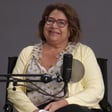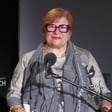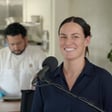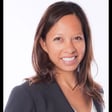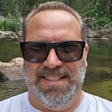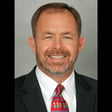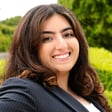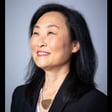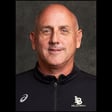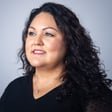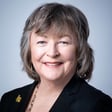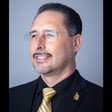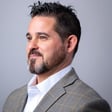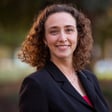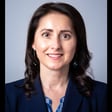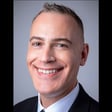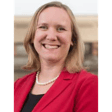Become a Creator today!Start creating today - Share your story with the world!
Start for free
00:00:00
00:00:01

S1 – E3: Academics…and more!
Dan’s guest, Dr. Karyn Scissum Gunn (CSULB’s provost and senior vice president for Academic Affairs), discusses faculty, students, programs and plans at The Beach.
Transcript
Introduction of Dan Montoya and Dr. Karen Sism Gunn
00:00:17
Speaker
Hello, I'm Dan Montoya, vice president of university relations and development, and the host of the podcast at the beach. This podcast produced by URD shares news of accomplishments and honors. Personal stories and ways listeners can become involved with Cal State Long Beach. My guests today, and I'm honored to have Dr. Karen Sism Gunn, provost and senior vice president for academic affairs. Dr. Sism Gunn, who joined CSULB on July 2021.
00:00:45
Speaker
serves as the chief academic officer for the institution, providing leadership for all academic matters at the university. Welcome, Provost Zimgun. Thank you, VP Montoya. Thank you for having me this morning.
Defining Student Success at CSULB
00:00:59
Speaker
So today we're just going to get into a conversation about the area that you oversee, which is a really large area and a big task. So let me share a little bit more about you. So prior to joining us here at the beach, you were at a Crosstown rival, CSU Fullerton. And before that, you served at more than two decades at Alabama State University in Montgomery.
00:01:23
Speaker
At those campuses and here at CSULB you've developed a really impressive track record as an academic leader and innovative administrator focused on student success. So I wanted to ask you one of the first questions is what does student success mean to you and how are we doing as a campus in this area?
00:01:44
Speaker
Yeah, thank you for this really important question, Dan. You know, for me, student success means serving all students. And if you've heard any of my press or any of the conversations that I've had in the campus, I emphasize that word, capital A, capital L, capital L.
00:02:03
Speaker
Student success means serving all our students and all aspects of a student's well-being to ensure they can achieve both in and outside the classroom.
GI 2025 Movement and Its Impact
00:02:12
Speaker
You mentioned a bit about my background and my journey to the CSU. For me, one of the signal determining factors for my interest in coming to the beach in 2021, and in particular to the CSU prior to that in 2017,
00:02:31
Speaker
centered around the GI 2025 movement. That's the graduation initiative that all 23 campuses in the Cal State system pursue. And from afar, before I came to the CSU, I thought this was an audacious undertaking for an entire campus university system consisting of 23 campuses educating at that time nearly 480,000 students.
00:02:58
Speaker
to all rally around a common effort to better assure undergraduate students opportunities, to complete their degrees by focusing on important factors such as reducing barriers and eliminating equity gaps, how many students are graduating, when they're graduating, keeping them enrolled, focusing on gatekeeper courses that students may be having trouble in,
00:03:24
Speaker
You know, and equipping faculty with new ways to help students thrive in the classroom.
Diverse Student Population and Success Tracking
00:03:28
Speaker
All of them. I thought that was significant and impactful. And this is of course significant for our diverse urban campus where 54% of our students identify as minoritized, you know.
00:03:41
Speaker
49 or so percent of our students identify as Hispanic Latino, 4 percent of our students on campus identify as Black or African American, 0.1 percent of our students identify as American Indian or Alaska Native. So we have a very diverse population and more than half of our students identify with minoritized populations.
00:04:04
Speaker
So, intentionally measuring, tracking, and reporting our student success outcomes is the way we determine the impact we're making on our efforts. You know, to students and their families, to our alumni, to our legislators, and to the publics we're responsible to. We are, and I dare say, we're duty-bound. We're obligated.
00:04:25
Speaker
to support our students' ability to successfully complete their degree programs, which is central to our reason for existing as a college campus, right? Right. Yeah, so nearly 48% of our students come from backgrounds where their parents didn't attend college or didn't complete a college degree.
00:04:43
Speaker
So I say all of that is central to my why for this work, student success. I call it my jam, right? And even as provost with all the myriad responsibilities we have, I remain closely engaged with our campus student success efforts through the leadership of many of our campus partners. Right, right. Wow, that's amazing.
Introduction to Beach XP Program
00:05:06
Speaker
So of these areas, what are some of the programs that are standouts for you
00:05:13
Speaker
Are there particular teaching, creative, and research efforts you feel distinguish CSULB from other universities? Yeah. Well, we are the beach. Let me say that first and foremost. That positions us as an exemplar in and of itself. There's so many examples of beach excellence. But I will, as I think about it, call on one that's a very recent development for our campus that we're very excited about. And it's called Beach XP. Right.
00:05:42
Speaker
Beach XP is a real standout for me in its inaugural rollout this academic year. Beach XP is a learning community, a program we recently launched during the fall semester.
00:05:57
Speaker
And of course, Beach XP, for our audience's purposes, is short for Beach Experience. This program is designed for first-time first-year students to connect to their peers, to our campus, and to the numerous resources and supports we offer for students at the start of their academic journey. You know, I look at the first year as a launching pad. I liken it to a plane taking off.
00:06:21
Speaker
The flight is the student's journey, but that first-year experience is where all the thrust and lift is invested to make sure that that plane lifts and is able to achieve its flight. And so as an analogy, the first-year experience, getting our students off to a strong start
00:06:40
Speaker
is a very important indicator to their sustained success. So the Beach XP program in its design is designed to help do that. It's all about helping incoming students navigate the college process with personalized guidance to keep them engaged and motivated to acclimate them to their faculty members and to the campus environment and to help them remain motivated as they continue their studies.
00:07:09
Speaker
I think this first year is going to be critical in setting this program up for success as we measure the impact that it's having on students choosing to stay, being academically eligible to stay, demonstrating a sense of belonging that the beach is for me. I feel I found my sense of place and purpose here. This is a place where I can thrive and grow. I think it's going to be very telling as we
00:07:36
Speaker
really examine the outcomes that we achieve with this rollout of Beach XP. So we're very excited as a campus. There's been a lot of faculty, Goodwill staff and others who have invested in the success of this program. And so we'll examine its outcomes and determine how we can achieve some scalability. Right now we're serving about 750 students.
00:08:00
Speaker
Yeah, so based on, we use data. We like to be able to demonstrate, not just anecdotally whether or not an initiative is working, but we also like to use an evidence-based approach to make sure that we're demonstrating the outcomes that we hope to achieve.
Celebrating Innovative Student Success Strategies
00:08:19
Speaker
And a second exemplar that I'll list, because it's so recent and it's so important, is the fact that I'm proud to announce and help announce, I know that the formal announcement went out on yesterday, that one of our very own, one of our beach finest,
00:08:35
Speaker
Dr. Kelly Young, a professor in the Department of Biological Sciences, has been selected as a recipient of the Wong Family Excellence Award for Outstanding Faculty Innovator in Student Success. Yay, go Kelly. That's awesome. That is so awesome. Kelly is one of only five recipients, four California State University faculty, and one staff member from across all 323 campuses.
00:09:01
Speaker
to receive this prestigious and coveted award so it is it is just our signal pride and honor to be able to announce that and to congratulate kelly kelly and her fellow recipients were honored yesterday at a ceremony during the board of trustees meeting but we we have
00:09:20
Speaker
Kelly is a long-standing faculty member and she's been able to implement some strategies around mentoring that have attained a national impact. Notable in her years of commitment here to the university is the development of the nationally acclaimed AIM program. That's the acronym. I believe the name is Advancing Inclusive Mentoring.
00:09:47
Speaker
And we call that beach mentoring here on our campus, the beach mentor program. This program focuses on faculty mentorship through an equity and inclusivity lens. It helps to introduce professors to a host of best practices and really offers a template for establishing a community in which professors can guide and support one another. And I understand that more than 600 or so professors have completed AIM.
00:10:16
Speaker
Or some version of it has been implemented at, I think, about nine CSU campuses to date. So way to go, Kelly. These best practices have been recognized. They've been tested. They've been determined to be effective. And she is just one of many shining examples of beach research and teaching.
00:10:36
Speaker
and how that's interwoven for highly impactful results. And I just can't say enough about how proud we are of her. And so many of our faculty members and staff members who contribute excellence here at the Beach. Right. And that's amazing. Congratulations to Kelly. And you're right. There's so many great faculty here on this campus. So it gives a great segue to my next question. How would you describe the work of faculty? And what does it take to teach here at the Beach?
Faculty Roles and Instructional Excellence
00:11:06
Speaker
And what do you expect from our professors, our lecturers, and the people who support them? That's such a central question because faculty members deliver the heart of our mission. A college campus simply cannot function without the commitment, expertise, passion, and compassion for our students and serving as members of
00:11:30
Speaker
a community like the beach. They're on the front lines of student success. They're on the front lines of student well-being. I think it's well recognized that sometimes a faculty member is the very first person that a student will entrust with
00:11:47
Speaker
some matter or some concern or some need that they have. So faculty members are recognized as in their role on the front lines of student success, really. And they're looked up to by so many of our students for guidance.
00:12:03
Speaker
We have a stellar faculty doing amazing work in their fields of study. The impact, especially for campuses in the CSU with a teaching mission like ours, is where that expertise gets translated into the classroom learning experience for all students. This element, in my opinion, this element of instructional excellence is where our faculty can deploy approaches in the classroom.
00:12:31
Speaker
And these approaches can be aimed to acknowledge and connect with the reality that our students come from in a wide range of backgrounds and experiences. And by approaching an ideology of such, this empowers our faculty members to really, really impact students in myriad ways. We have faculty from around the world who themselves have learned in diverse ways.
00:13:01
Speaker
We all can remember a favorite professor or a professor who was kind of the bane of our existence. And much of it may have had to do with the way the instructor chose to deliver the curriculum in the classroom, right?
00:13:17
Speaker
The key, in my opinion, is flipping the class dynamic from the sage on the stage. The student reaches me where I am, and the student reaches where I am. To instead, I'm reaching my students where they are. And I'm creating success pathways, if you will, to where I am.
00:13:40
Speaker
That's a fundamental feature of modern instructional approaches. I think higher education is more diverse than ever. I think it's debatable as it relates to the original nature of higher education and the populations that higher education was designed to serve. That's all changed.
00:14:03
Speaker
You know, the world that we live in has changed. The world that we're preparing students for has changed. And the way we teach them also has really evolved. You know, there's some incredible examples of this type of work, this kind of modern instructional methodology going on to provide support and outcomes. And these approaches are showing promise. And I'll give you an example.
Dr. Kelly Young's Modern Teaching and Mentorship
00:14:30
Speaker
Our faculty center is hosting numerous professional development experiences for faculty who, you know, want to reflect on their instructional practices. They are invested in the outcomes that they're seeing in their courses. They want to more deeply explore ways that they can be more impactful in the classroom.
00:14:51
Speaker
Those are opportunities that our faculty center hosts for our great faculty members to be able to engage in and pick up on best practices, diverse learning styles, how to remain effective in a diverse classroom, all those types of topics.
00:15:13
Speaker
But I can also bring back, shine the light back on the example that I already mentioned as it relates to Dr. Kelly Young. Kelly shares strategies she implements in her classes to address what we call DFW grades. You know, that's the percentage of students who don't earn passing grades. They earn either a D grade or an F or they withdraw from the course.
00:15:39
Speaker
And in her anatomy course, these DFW rates, she noticed, she took notice of the rates, and they were unacceptably high to her. And using certain strategies, she reduced those DFW rates by over half.
00:15:56
Speaker
Yeah, by using some strategies that are a part of the AIM program, the Beach Mentor Program that we mentioned. And some of them are, you know, wrap to your students. Have conversations with them on a range of practical issues.
00:16:13
Speaker
including making sure their class and work schedules are appropriate for their course load, checking in with them on how well they're doing and managing the balance of going to school, being great, going to work, taking care of life, all of those things matter to students. And they show up in the classroom in the context of that holistic set of realities that they live in, right? She also provides tips for success to our students.
00:16:42
Speaker
on how to improve their performance. Let's say they didn't do well early on a test or a quiz. She intentionally invests in them and she guides them on ways to improve their performance. Very, very active teaching in that regard. She's aware of students' different learning processes. She advocates connecting class content, for instance, to real world events to make the class come alive for students.
00:17:10
Speaker
and is in constant communication with them. So I lift up her programming as an example of what I think is key in contemporary higher education instruction. And that's posturing oneself clearly as learning advocates and investors in our students' success, and students know the difference.
00:17:34
Speaker
So teaching at the beach presents a special platform, I think, for faculty to both fulfill their work, the expertise, the many years that they invest in their craft, while also engaging in scholarship that fuels their passions.
00:17:51
Speaker
then engaging in the laboratory of the student success learning environment, right? To bring that expertise to life in meaningful ways and constantly reinventing the ways we engage with our students in the classroom. I think that makes for a very strong faculty approach to excellent learning.
00:18:15
Speaker
As provost, that's what I'm looking for, not only in new faculty we hire, our new faculty undergo a series of orientation experiences, but also our existing faculty as well. It's no secret that we have some of the best faculty literally in the world right here at the beach, and continuous improvement is part of what we do.
00:18:38
Speaker
And that is a reflective practice that I continue to champion among all of our faculty members here at the Beach. That is awesome. I love the continuous improvement. And I also think what you talked about is continuous connection. And I love that because students are looking for that opportunity to connect
00:19:00
Speaker
with those that are teaching them and instructing them and influencing them. And you're right, they remember for many, many years to come. And again, you just flow right into my next question, which I love.
Compassion and Continuous Improvement at CSULB
00:19:13
Speaker
And last August, at the opening of the convocation, you spoke of compassion and how it is needed here at the beach. How would you measure our progress on this? How are we doing? And what could we do better?
00:19:31
Speaker
That's a rich question. You're right. I emphasized at convocation that every day I see examples of compassion here at the beach. It's the why, why we come to work. It's in the programs and support services we offer. And it's in those little daily acts of kindness that we do for each other.
00:19:56
Speaker
I think we're doing fine, but I know we can always do better. Going back to continuous improvement, I think it's a trap to say we've arrived because there are always ways that we can reflect and do better what we intend to do.
00:20:13
Speaker
the world is especially challenging to navigate right now on so many levels there's so much happening both locally and globally and and this really takes a toll on on our daily lives and i i have a a compassion and i try to think about just me personally i try to think about what people may be going through you know what what might be behind that smile people are showing up and they're they're working but they but they have
00:20:41
Speaker
they have matters that are of concern to them. And I try to be compassionate and remember that we're all human and we all carry things around with us on a daily basis, right? So we can always continue to improve. I believe in trying to make someone's day by just having a friendly face. And my mother told me years ago, I told her once, I said, mom, sometimes I'm out and about and complete strangers will come up and
00:21:11
Speaker
and start a conversation with me. And I try to very, in a slick way, look over at my watch, but I'm too, I'm very Southern and very polite and I'm too polite to be abrupt and cut people off. And she said, you have a kind face.
00:21:24
Speaker
And I said, okay, I'll live with that. That's your fault and that's dad's fault, but I'll live with that. But I try to show up in a posture that's open, a listening posture, a respectful posture. I try to model not only the work that we do, but how we approach the work that we do, because ultimately we don't do this work for ourselves, we do it for somebody else. Absolutely.
00:21:49
Speaker
Right. So, you know, just sharing that encouragement and trying to be a model sometimes in spite of and not because of. I talked to a group yesterday about leadership and sometimes it's about thriving in the midst of, in spite of.
00:22:04
Speaker
and not because something is just the way we expected it to go. So being that source of encouragement to others is important for me. And it's important for others to also try to aspire to model that kind of care and compassion for others. Well, thank you for doing that. And I've witnessed that too, Karen. So thank you so much for showing that compassion to others. I think it's so important.
00:22:31
Speaker
So here at the beach, we're outspoken about our commitment to first generation students and diverse communities we serve and that we are representing all over our campus.
Supporting First-Generation Students
00:22:45
Speaker
What remains to be done?
00:22:48
Speaker
You've got some big questions, Dan. I sure do. They are big questions. We grapple with it. It is really the fuel behind the myriad programs and examination of data, all of those things that we do. And you named one of our most prized
00:23:08
Speaker
populations of students, those students who are first in their families to go through an experience and complete the college experience. Our Beach faculty
00:23:23
Speaker
and family at large has worked, I think, diligently to ensure our campus represents our first generation population with openness, with authenticity, with congratulation, with pride, with joy, with keep doing your thing, we've got you, and you're going to be successful.
00:23:43
Speaker
Some of our shining efforts include our first generation open house, which serves as in the form of, I believe, resource fairs and networking hubs and other kinds of supports for those who are navigating the college experience. We have a program that's called GenXL and its existence is to partner
00:24:07
Speaker
and support students with peer and faculty mentors to help students during their transition to higher education. We amplify enriching experiences, you know, values such as community building and resources. And what remains to be done is to prepare students for life after college.
00:24:33
Speaker
So it's my hope that we can create strategies for our first generation students to continue to build their readiness to go out and to be successful in the world by building strong professional networks.
00:24:48
Speaker
so they can gain access to the workforce upon graduation. That is the goal. We measure in very penetrating ways factors such as degree completion. But our existence is not for students to complete those degrees. It's to complete those degrees so that they are positioned
00:25:08
Speaker
to go out into the workforce, into the world, and to simplify it to make it a better place through their expertise and contribution. Absolutely. Yeah. So I think also providing students with paid internships is key.
00:25:26
Speaker
and we are working in, there are many quarters on campus that are working through philanthropic opportunities and other types of ways to be able to offer and sustain paid internships because we know our students, it asks a lot for a student to pursue an internship when they have these other factors going on in life and they're not able to
00:25:53
Speaker
you know, have the kinds of resources that will help them sustain the internship, that will help them sustain being able to continue their courses. Our resources are key. So I hope we can continue to build our first generation students, to expose them to, you know, open up the campus in important ways to support their success.
00:26:17
Speaker
continue to find opportunities that help to sustain their success, to position them for opportunities, to think about what the workforce and the life outside of campus beyond their college studies is like so that they are confident as they navigate this experience and they go through successfully and they go on to do great things. Yeah, absolutely. I think if you talk to
00:26:45
Speaker
Any parent, any student, any alumni, it's really about preparing them to be global citizens and compete in the market. So that's absolutely right and where we're trying to take them. So I'm going to, over the last several years, CSU OB has up its commitment to the black community here on campus and elsewhere.
00:27:05
Speaker
We continue to work at strengthening our black alumni affinity group, raising money for scholarships, supporting faculty and staff.
Black Excellence Collegium Formation
00:27:13
Speaker
What are we doing right? And what can we do more to promote the beach to the black community and other communities of color?
00:27:23
Speaker
So let me start with a quote from one of our faculty members last semester as we worked in community toward an initiative I'll talk about in my comments. That faculty member said, here at the beach, we know that we're trying to do things well for our black community, but this moment, there's something about this moment.
00:27:51
Speaker
that feels different. There's something about the intentionality of this moment that feels like we're headed toward a different level of being able to support our students of color in general, but our black students in particular, you heard the percentage of our enrollment that I mentioned as it relates to our black students, 4%.
00:28:14
Speaker
4% of our enrollment is comprised of our black and African American students. So there's a lot of good intentionality happening to reach all of our students, but our communities of color in particular and our
00:28:31
Speaker
black students especially. The first thing I'll mention is we recently formed what's called a Black Excellence Collegium, the BEC. This organization is a grassroots organization that will consist of faculty, staff, and students, and there may even be some
00:28:54
Speaker
long beach community members who were invited to membership and and the aim of this group will be to address academic and student success outcomes for black students but to also serve as a point of community of purpose and visibility for black beach and that is the the name of this proud population of faculty staff and students and i am a proud member of what we call black beach
00:29:20
Speaker
This light being shown on the state of black students became an urgent and critical need throughout the CSU once a definitive report was produced that was commissioned by the Chancellor's Office. And that report is called Advancing Black Student Success and Elevating Black Excellence.
00:29:45
Speaker
This report in its depth confirmed that there is still so much to do in many ways to ensure that our black students, all students, but those factors that elevate our black students in particular, it's an important time so that the students feel seen, they feel supported, they feel that they have a sense of place, of purpose, and they're able to thrive
00:30:15
Speaker
They're able to navigate whatever barriers that may threaten their ability to remain in school and to continue moving forward and get their degrees and go on out and do great things. So this Black Excellence Collegium will function very much like another organization that was formed last year. And we proudly want to note the El Concilio for Latinx success.
00:30:42
Speaker
Now this partner organization, and I do believe these organizations will find much common ground and will synergize one another's work, but the El Concilio was an organization that was born largely out of our, and I'm proud to say successful, efforts to attain the Seal of Excellency designation as a Latinx serving campus.
00:31:07
Speaker
That was a very intensive process. It's a certification of pride of sorts. And the El Concilio was the Latinx community grassroots organization that worked so hard to develop a comprehensive inventory of resources that we offer that help support and uplift our Latinx community. And so very much like El Concilio, the Black Excellence Collegium has engaged in some due diligence work.
00:31:36
Speaker
This group partnered with our black faculty and staff association with many many many offices and units on campus to complete what's called an inventory of our support structures and practices and policies.
00:31:52
Speaker
that currently exist and how well or not these elements serve to support the success of all students, but in particular our black students. And so this assessment informed subsequently a comprehensive campus proposal that was submitted to the chancellor's office to seed funding for 18 months of very intentional work around elevating black students from
00:32:22
Speaker
positioning the beach to partner with the Long Beach LBUSD, Long Beach Unified School District, to reach even into the middle school levels, right? One of the things we know about admission to a CSU is that students have to, one of the entrance requirements, admission requirements, is students have to complete what's called the A through G.
00:32:47
Speaker
curriculum in high school. And there are data that suggests that of the black students who complete their studies, only about 50% of them complete the A through G curriculum in high school.
00:33:01
Speaker
Right? And so that right there is an opportunity that our president, Jane Connolly, and the superintendent of LBUSD, Dr. Jill Baker, are really interested in helping these great organizations partner to better prepare LBUSD students for entrance to a CSU and hopefully to, of course, the beach.
00:33:25
Speaker
Right? So we're hoping to hear results from that proposal any day now, but we're very excited about that work. You know, we're building up our faculty as another approach. I mentioned our faculty learning communities that focus on
00:33:41
Speaker
you know, equipping faculty with instructional best practices where there are also efforts to equip faculty on understanding the cultural breadth and beauty of the students who make up their courses and how to implement what we call
00:33:58
Speaker
culturally responsive pedagogy so that students can benefit from the coursework in very meaningful ways. So we want all of our faculty to understand their students, right? We talked a little bit earlier about how our students have changed, the students we serve, their change is about.
00:34:23
Speaker
And so it's about making sure that all of our students are capable of success, learning those strategies that best assure our students success, leveraging one another for ways to
00:34:39
Speaker
Engage and learn more about our students unique experiences and parlay that into excellence in the classroom. There's there's just so much so i. I hope you can hear my voice i get i get jazzed about this work i'm just hopeful about it and i'm inspired by it.
00:34:58
Speaker
And I'm proud that Academic Affairs is taking these steps to put the people in place, working with our cross-campus partners, with your division, Dan, with Beth Lesson in Student Affairs, and with Scott Appell, and with Min Yao in DO-IT. They have the coolest divisional name, the Division of IT.
00:35:22
Speaker
just to make sure that as a campus we undergird and provide structure for that that signals success yes and and again i commend you for your work on this and and i also commend you for you know helping with the seal of excellency because
00:35:39
Speaker
many institutions do not get it on the first try and we did so that was pretty amazing so kudos to you and the team and everybody involved so that is awesome indeed go beach so speaking of that again you teed it up again and so
00:35:57
Speaker
When we in our division and being external with our alumni and our community, we're always looking for ways for them to get connected and really enhance and grow their experience with the beach. So what are the best ways for alumni, friends, and others to stay connected with what academic affairs is doing?
00:36:19
Speaker
And what's the best way that they can support your team's efforts? Are there any particular initiatives that you're seeking support for at this time and ways that people can help us philanthropically?
00:36:33
Speaker
Yes.
Social Media Engagement for Academic Updates
00:36:35
Speaker
We live in the age of social media. There is no doubt about it. That is the way, the primary way, I would say the front door, if you will, to get those SNAP updates on goings on at the beach. So please, please, please, I invite you to follow me at Provost KSG.
00:36:59
Speaker
That's my handle. Me and my communications team are constantly sharing updates on Instagram, on X, on LinkedIn, about the division. We post articles on division-wide efforts. We share academic resources, updates from the colleges. We use that platform as a way to amplify
00:37:22
Speaker
and inform our community about the great achievements that are going on with our students, with our faculty, and with our staff, and just those good things that are going on at the beach. Sometimes we elevate and push out messages from others because we want to be a part of helping them tell their stories as well. So follow me on
00:37:50
Speaker
at Provost KSG on Instagram and X and on LinkedIn at CSULB Academic Affairs.
00:38:04
Speaker
All right, I've thoroughly enjoyed this conversation. I've learned so much. Me too. But I'm going to ask you the final question.
Dr. Gunn's Personal Stories and Motivations
00:38:12
Speaker
And this is really to get a snapshot about you and what makes you tick. So what motivates you? And what is it that drives you to do what you do?
00:38:25
Speaker
So my thank you for that question, Dan, because I've talked at length about all of us showing up in the context of who we are. So it's really good to know more about one another as we can. I have to say, I am driven by an internal
00:38:47
Speaker
a sense of a faith structure. That's kind of the engine from which I operate. I fundamentally believe that all people can thrive if they're provided what they need in order to do so. And I fundamentally believe
00:39:06
Speaker
that through my own life experiences, I am a living example of a Christian scripture that suggests that to whom much is given, much is expected.
00:39:24
Speaker
I've told this story before. I grew up on the campus of Tuskegee University. It's a historic black college that was founded in 1881 by Booker T. Washington. And one of the driving forces in lifting up and providing higher education for black people when
00:39:46
Speaker
such a time was not possible, such a way was not possible. And I grew up on that campus under that context and reality. I could look out my bedroom window and see this famous bronze statue of Booker T. Washington. It's called Lifting the Veil of Ignorance, and he's standing behind a slave who's sitting on a plow, and there's a
00:40:09
Speaker
a shroud over the enslaved person, and he's pulling that back, symbolically saying, there is a world for you through education for you to be able to go out and contribute. And so I believe growing up in that environment meant that much was poured into me, and growing up in a household of educators meant that I had much to pour, I was responsible
00:40:38
Speaker
and duty bound to poor as I could and to others. My whole family, my immediate family is, I come from a family of educators and they meant that. Right? My parents grew up in the civil rights movement and they knew
00:40:54
Speaker
that the power of education was an equalizer in so many ways. And they dedicated their lives to their craft and using their influence and their example for excellence among young people to strive and be the best you could. And growing up in Tuskegee, everybody looked like me.
00:41:19
Speaker
right in this college town where the whole civic structure, the whole community structure was one of what I've come to realize is representation. And that is why I feel like this platform that I have in higher education is to make space for those who may otherwise not have opportunity.
00:41:43
Speaker
to attain, to reach for and attain these kinds of goals. So those are kind of internal motivators that drive me, that wake me up in the morning, they undergird my why. Very much like you, I know you talk about your family being a big motivator for you. You always mention your upbringing and your family life and they seem to be a source of
00:42:09
Speaker
love and support and guidance. That resonates so deeply with me because I had a similar experience. And I've tried my best to be responsible, to be ethical, to be moral, and to be authentic about doing my level best for someone else. I've had so many people to pour into me. None of us have reached these places where we can help steer and guide a university.
00:42:38
Speaker
by ourselves, right? There are many people who invest in us as teachers, as preachers, as family members, as mentors, you name it. But you get to a certain point where you feel compelled that it is not yours to own, that you must use what's been invested in you to lay tracks for somebody else coming behind you. So that's kind of what motivates me
00:43:04
Speaker
And I think higher education was a natural platform and way for me to live what I feel is my life mission.
Conclusion and Closing Cheer
00:43:14
Speaker
That is, I can totally relate to that. And again, I think because we've been blessed with so much, and you're right, education has been the game changer for me. And so it's our responsibility to help the next generation.
00:43:29
Speaker
climb on our shoulders and go on and be successful. And so the more we can do that, I think the more we'll elevate other generations to go on and take our place and do these things. So thank you for that. And I appreciate you telling us your story and a little bit about you because
00:43:47
Speaker
You know, at the end of the day, we are people. That's right. And it's good to know each other and what we do. And so I can say it's been a pleasure working alongside you and helping you in the division do some amazing things. I look forward to the great things that we're going to do. And, you know, I look forward to the amazing spring semester we're going to have. So. Indeed, my friend. With that, I'll wrap up another edition of At the Beach. I want to thank Provost Karen Sism-Gun.
00:44:13
Speaker
for her time and insights. Until next time, I'm your host, Dan Montoya, and we're gonna leave you with a Go Beach on three. One, two, three. Go Beach!
